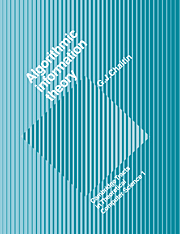Book contents
A - Implementation Notes
Published online by Cambridge University Press: 23 November 2009
Summary
The programs in this book were run under the VM/CMS time-sharing system on a large IBM 370 mainframe, a 3090 processor. A virtual machine with 4 megabytes of storage was used.
The compiler for converting register machine programs into exponential diophantine equations is a 700-line REXX program. REXX is a very nice and easy to use pattern-matching string processing language implemented by means of a very efficient interpreter.
There are three implementations of our version of pure LISP:
The first is in REXX, and is 350 lines of code. This is the simplest implementation of the LISP interpreter, and it serves as an “executable design document.”
The second is on a simulated register machine. This implementation consists of a 250-line REXX driver that converts M-expressions into S-expressions, remembers function definitions, and does most input and output formating, and a 1000-line 370 Assembler H expression evaluator. The REXX driver wraps each expression in a lambda expression which binds all current definitions, and then hands it to the assembler expression evaluator. The 1000 lines of assembler code includes the register machine simulator, many macro definitions, and the LISP interpreter in register machine language. This is the slowest of the three implementations; its goals are theoretical, but it is fast enough to test and debug.
The third LISP implementation, like the previous one, has a 250-line REXX driver; the real work is done by a 700-line 370 Assembler Hexpression evaluator. This is the high-performance evaluator, and it is amazingly small: less than 8K bytes of 370 machine language code, tables, and buffers, plus a megabyte of storage for the stack, and two megabytes for the heap, so that there is another megabyte left over for the REXX driver. It gets by without a garbage collector: since all information that must be preserved from one evaluation to another (mostly function definitions) is in the form of REXX character strings, the expression evaluator can be reinitialized after each evaluation. Another reason for the simplicity and speed of this interpreter is that our version of pure LISP is "permissive;" error checking and the production of diagnostic messages are usually a substantial portion of an interpreter.
- Type
- Chapter
- Information
- Algorithmic Information Theory , pp. 165 - 166Publisher: Cambridge University PressPrint publication year: 1987



